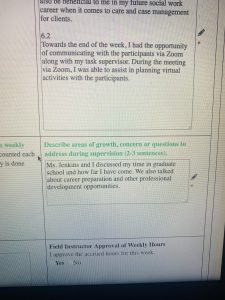
It is imperative that social workers gain skills on how to work with clients at the micro, mezzo, and macro levels. Even if a social worker may work at the macro level, it is also important that the social worker has skills in engaging with clients at the micro and mezzo levels. Engagement in social work is crucial because it shows clients at the micro and mezzo levels that they are cared for. A well-rounded competent social worker should be able to use their skills in any type of situation that involves improving the lives of individuals, families, groups, organizations, or communities. This could include food banks, homeless shelters, medical services, mental health agencies, or therapy services.
6A – Examine evidence-based practices to prepare for professional engagement across system
Course Evidence: For my Advanced Administration I class during the first semester, my fellow colleagues and I were required to create a program that addresses a specific issue within social work for a certain population. The population that my group chose were adolescents who are attending Ooltewah High School and are struggling with substance abuse. Throughout the semester, my group and I strategized on the program in terms of how we were going to go about creating it and researching the specific mental health needs in the State of Tennessee for adolescents. Towards the end of the semester, we delivered a presentation of the program that was created using the specific skills and concepts that were grasped in the Advanced Administration I class.
Advanced Administration I Paper
Knowledge: The knowledge being implemented for this competency mainly comes from the Advanced Administration I class where we learned about program development and the specific steps to create a program.
Field Evidence: For my special project, I had to do an analysis on the current on the COVID-19 pandemic and how it pertains to the state of Tennessee, the participants at Signal Centers. In this analysis, I also explained how the nine different competencies were being applied during the current pandemic. For competency 6, I explained how systems theory and conflict theory are being applied by social workers.
Values: The values being implemented in this competency is service. Using art therapy with the participants at Signal Centers who have developmental disabilities allows for me to reach them where they are and build the appropriate rapport and relationships with them.
Skills: The specific skills that I am using are art therapy and also leadership. Many times the activities coordinator may or may not be available to demonstrate the instructions for the planned activities. Therefore, I have taken leadership in the activities so that the participants continue to be engaged.
6B -Engage with systems utilizing evidence-based practice strategies.
Course Evidence: For my Advanced Clinical Practice II class, through the semester, I was required to consistently practice pseudo group therapy sessions with my colleagues. Completing these pseudo therapy sessions throughout each module during the semester has allowed me to build upon the basic mezzo social work skills that I gained while pursuing my undergraduate social work degree. In the pseudo sessions, I practiced rounds, dyads, and therapeutic exercises with the group. This type of activity has been very helpful in gaining more clinical skills that will be of great use for me as a future clinical social worker.
Advanced Clinical Practice Video
Affective Process: Participating in the pseudo group sessions required me to listen and receive the information that was being given to me by the pseudo clients. During the pseudo sessions, I gave the pseudo clients opportunities to contribute to the group sessions as well.
Field Evidence: During the quarantine, towards the end of the semester, my task supervisor and other staff members had a Zoom meeting with the participants who usually attend Signal Centers. This meeting was to specifically check-in on the participants to see how they were doing in the midst of the pandemic that had ensued a month before.
Cognitive Process: This competency requires for me to recall the specific knowledge of the client’s current case file which is constantly being updated due to their ever changing situation. But it also requires that I comprehend new information about the participant regarding their status with their caregiver at home and at Signal Centers.
Theoretical foundation: The theoretical foundation for this competency that is being used is the General Systems theory. This theory acknowledges that there are specific systems at play when it comes to human behavior and the social environment. In this competency, I addressed my experiences with groups, participants, my field placement, and families, all of which are specific systems that I interact with to achieve specific goals.
Additional Evidence: This semester, I took a certification course from the Starr Commonwealth organization which was called Trauma-Informed Resilient Schools. The information that I learned from this certification was very relevant and complementary to what I was learning in my Advanced Clinical classes from the past two semesters. From this certification, I was able to learn about the impact that trauma has on the learning experience of children and how to implement evidence-based practices with children and adolescents dealing with trauma.
